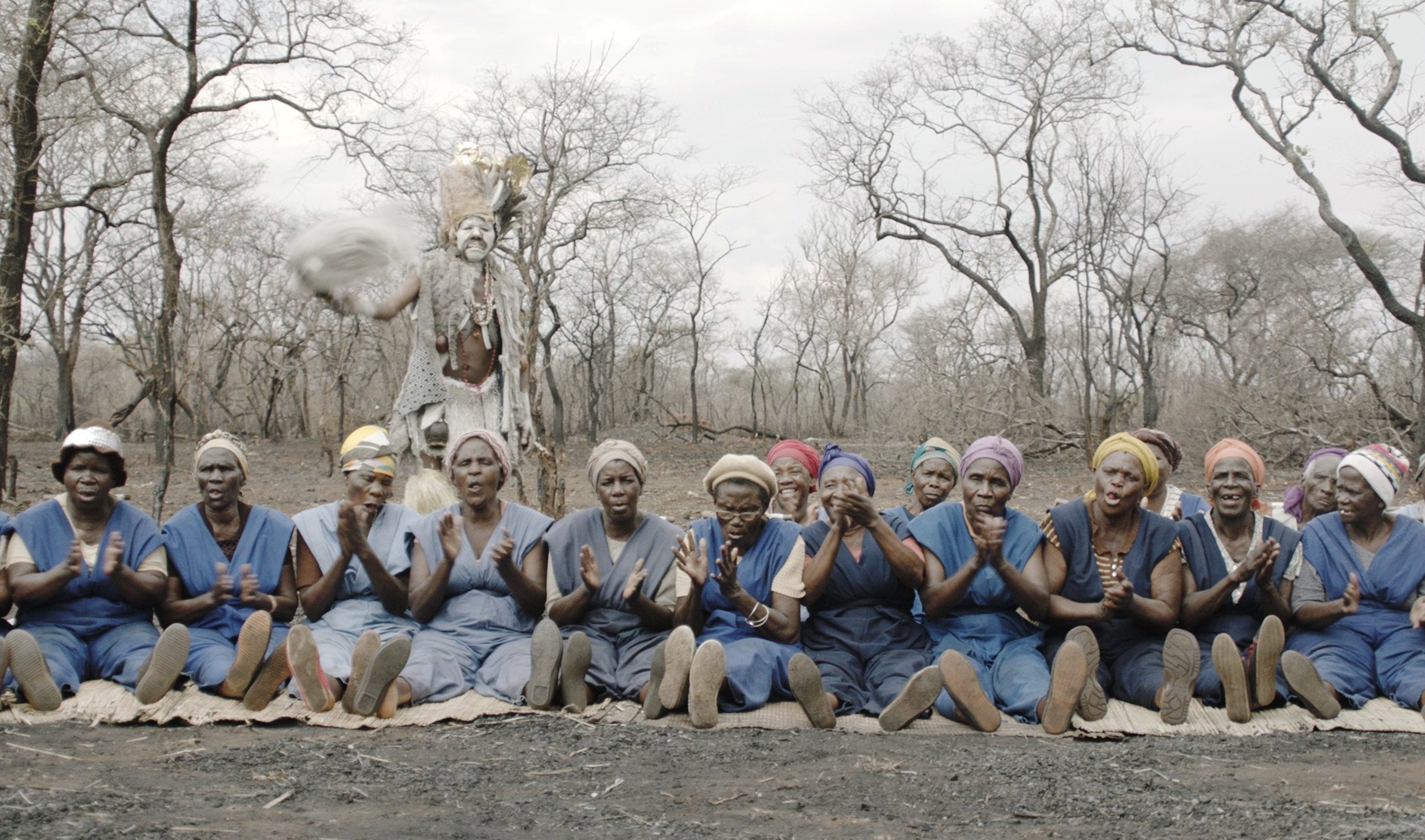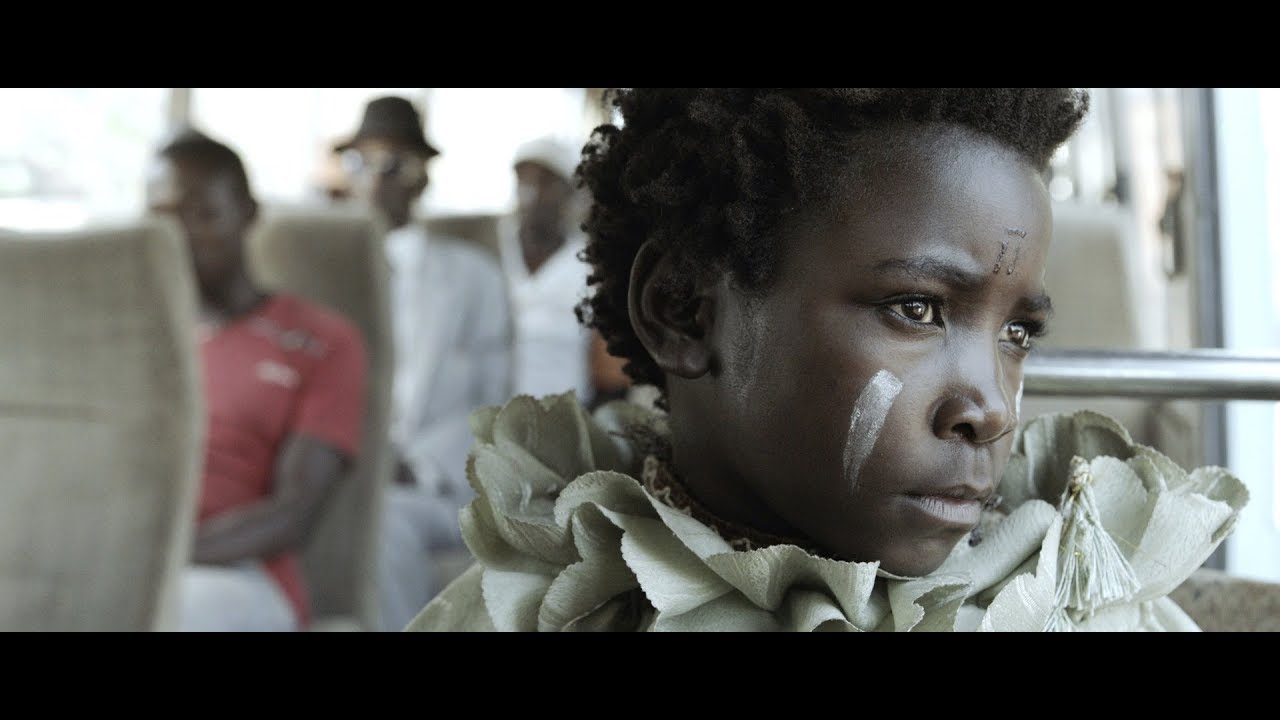A group of older Zambian women — seated on the ground, penned in by a fence, faces painted and contorted into shrieks, bodies gesticulating wildly, long fluttering ribbons attached to their native dress like leashes — are photographed by smiling white tourists. A Godardian tracking shot slowly observes the human zoo; in our seats, we are the tourists. This indelible image kicks off Rungano Nyoni‘s I Am Not A Witch, a fierce, assured debut in English, Bemba, Nyanja, and Tonga that doesn’t always cohere in its individual moments but proceeds with striking dream logic and undeniable passion.
 I Am Not A Witch is full of these images, hauntingly captured by David Gallego with some of the same trancelike acuity he brought to 2015’s Embrace of the Serpent. The story itself is a heartbreaking simplicity; Wikipedia’s one-sentence summary — “In Zambia, an 8-years old girl is sent to a witches’ camp after a banal incident at her local village.” — is true enough. Nyoni’s aesthetic interests lie outside of plot, at the intersections of colonialism and gender, “primitive” and “modern,” observer and observed.
I Am Not A Witch is full of these images, hauntingly captured by David Gallego with some of the same trancelike acuity he brought to 2015’s Embrace of the Serpent. The story itself is a heartbreaking simplicity; Wikipedia’s one-sentence summary — “In Zambia, an 8-years old girl is sent to a witches’ camp after a banal incident at her local village.” — is true enough. Nyoni’s aesthetic interests lie outside of plot, at the intersections of colonialism and gender, “primitive” and “modern,” observer and observed.
As the protagonist Shula, Maggie Mulubwa ably leads a cast of non-professionals, who cumulatively give I Am Not A Witch something of a verite feel. But, again, it’s something of a hyper-reality, more real than real, like a dream. People do not so much read their lines as state them, an effect Nyoni emphasizes with shots that linger too long and the occasional odd juxtaposition.
 Shula’s adventures can take her from a government-mandated outdoor school in a forest clearing to the set of a Zambian talk show, coming on after a hip-hop artist to sit silently while her overseer tries to normalized her presence and more urbanized Africans look with something like horror at her exploitation. All of the witches are attached to ribbons, which can be retracted by enormous, surreal spools when they are needed elsewhere.
Shula’s adventures can take her from a government-mandated outdoor school in a forest clearing to the set of a Zambian talk show, coming on after a hip-hop artist to sit silently while her overseer tries to normalized her presence and more urbanized Africans look with something like horror at her exploitation. All of the witches are attached to ribbons, which can be retracted by enormous, surreal spools when they are needed elsewhere.
In Caliban and the Witch, the pivotal text of sorcery, extermination, and capital, Silvia Federici wrote:
This process required the transformation of the body into a work-machine, and the subjugation of women to the reproduction of the work-force. Most of all, it required the destruction of the power of women which, in Europe as in America, was achieved through the extermination of the ‘witches.’
 Nyoni’s magic realist satire inverts this: witches are born rather than exterminated in Shula’s Zambia of the mind, though their bodies are still rendered work-machines for late capitalism. An early comic scene in I Am Not A Witch finds a villager recounting his evidence for Shula’s sorcery in detail to the local policewoman — the girl appeared out of nowhere and lopped his arm off! — before abashedly adding that this happened in a dream. Still, the information is sent up the chain, from village rumor to police report to corrupt government official Mr. Banda (Henry B.J. Phiri), who farms out his fleet of witches to solve crimes and change the weather for tributes. The feared and despised Feminine is also a lucrative commodity.
Nyoni’s magic realist satire inverts this: witches are born rather than exterminated in Shula’s Zambia of the mind, though their bodies are still rendered work-machines for late capitalism. An early comic scene in I Am Not A Witch finds a villager recounting his evidence for Shula’s sorcery in detail to the local policewoman — the girl appeared out of nowhere and lopped his arm off! — before abashedly adding that this happened in a dream. Still, the information is sent up the chain, from village rumor to police report to corrupt government official Mr. Banda (Henry B.J. Phiri), who farms out his fleet of witches to solve crimes and change the weather for tributes. The feared and despised Feminine is also a lucrative commodity.
Unevenness is built into I Am Not A Witch, so it’s problematic to fault Nyoni’s debut for jarring transitions and a slippery tone. In this sense, it reminded me of another inventive recent debut that juggled genre signifiers and thrived on surprise, Ana Lily Amirpour’s A Girl Walks Home Alone At Night. It’s hard to hold onto, but it’s also hard to forget.

